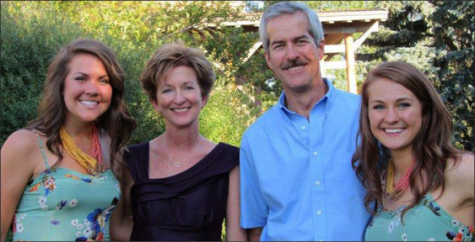ALS Ice Bucket Challenge hits home for Central athlete
November 13, 2014
At the age of 12, Rachel Hanses, with encouragement from her father, Scott Hanses, tried out for club volleyball at her school. She didn’t make the team.
Now in her junior year of volleyball at Central, outside hitter Hanses stuck with the sport despite the setback.

UNBREAKABLE BOND – Despite their setbacks, the Hanses family remains a tight-knit group who supports each other no matter the obstacles that come their way.
When off of the court, however, Hanses can be found at home in Yakima, hanging out with her parents. Whether it’s simply heading over for dinner during a weeknight, or seeing them at her volleyball games, Hanses has always enjoyed a close relationship with her mom and dad.
Months before Rachel Hanses’ high school graduation, Scott Hanses was diagnosed with amyotrophic lateral sclerosis (ALS). Once identified, doctors do not usually give ALS patients more than five years of life expectancy.
“Every [ALS] disease is so different,” Rachel Hanses said. “There are plateaus and big declines. When diagnosed, it’s usually one to three years, and he’s had it longer than that. He’s still doing great; he can still talk and everything.”
Rachel Hanses’ parents decided to wait until she was out of high school and well into summer before they made the formal announcement. After gathering Rachel and her two sisters, Kendra and Lee, Scott Hanses and his wife, Kathi Hanses, broke the crushing news.
“We didn’t want to interrupt Rachel’s last year of high school,” Scott Hanses said. “We decided to wait till summer break came, once everything was settled down.”
Scott Hanses suffers from what is known as “familial ALS,” or fALS. According to Adam Garcia, development associate at ALS Therapy Development Institute, in Cambridge Ma, fALS patients comprise only 10 percent of all diagnosed ALS cases, with the majority of ALS patients suffering from what is known as “sporadic ALS.”
“The difference between familial ALS and sporadic ALS is that with familial ALS there is a family history of ALS and an identified genetic mutation, such as SOD1, whereas with sporadic cases there is no genetic mutation identified and no family history of ALS present,” Garcia said via email. “Regardless if the form of ALS is sporadic or familial, after the disease manifests itself there is no difference in the mechanics of the disease.”
Made infamous by Lou Gehrig of the New York Yankees, ALS is a neurodegenerative disease in which motor neurons in the brain and spinal cord begin to deteriorate rapidly. Respiratory failure is the most common form of death from ALS.
“Some of [the symptoms] are very obvious, some of them are very subtle,” Scott Hanses said. “Currently, I’m unable to stand. I’ve lost all the muscles in my leg. My right arm has very little movement. I have a little strength in my left arm. Thankfully, it hasn’t affected too much of my ability to speak and eat but it has a little bit in my breathing. The cruelest part of the disease is that it does not affect your mind.”
According to Garcia, once fALS is identified in a parent, there is a chance of the mutated gene being passed down to their offspring, putting them at risk of developing ALS later in life.
All three of Scott Hanses’ children have a 50 percent chance of developing ALS.
“They’ve talked to me, they’ve said, ‘there are things you should do to help prevent it,’” Rachel Hanses said. “‘There are certain ways you should eat, certain ways you should live.’ Obviously they’re not gonna tell me how to live, just little suggestions.”
Controlling his daughters has never been on Scott Hanses’ agenda. Even when they were young, Scott and Kathi Hanses made the parenting decision to suggestions to their children, rather than demand. Once, Rachel Hanses literally took this to heart, demanding a name change.
“It was around the holiday times when she was a young girl,” Scott Hanses said. “We had a bunch of family at the house when she came walking in and asked for everyone’s attention. She walked in and said, ‘Hey, I want to tell everyone something, I for this day forward want to be known as Linda,’ and walked out. We called her Linda for a couple days.”
Rachel Hanses’ strong bond with her father has reinforced her drive to succeed in life.
“I don’t think I’ll find another guy like my dad,” Rachel said. “People say girls subconsciously find a guy that compares to my dad. I’ll never find anyone as incredible as he is. I can’t go to a grocery store in Yakima without someone saying ‘Scotty, I know him.’ He’s always been there for me. He and my mom are two of the reasons I’ve pushed myself harder.”



Eugen Lavole • Jan 22, 2023 at 6:56 am
My husband first symptoms of ALS occurred during covid, but was diagnosed in 2021 when he was 61 years. He was on Riluzole- not crazy about it! he was also on Gabapentin and Radicava not crazy about any of it either, The Rilutek (riluzole) did very little to help him. The medical team did even less. His decline was rapid and devastating. His arms weakened first, then his hands and legs. I was a master Gardener and love herbs! This ALS took my life from me, I was no longer able to work in my garden anymore because I was a full time caregiver for my husband. We stopped most of his ALS medications due to severe side effects and I started him on herbal treatments from Health Herbs Clinic (healthherbsclinic. c om), the treatment has made a very huge difference for him. His symptoms including body weakness and slurred speech disappeared after few months on the treatment. He is getting active again since starting this treatment, he is able to walk and able to ride his treadmill again.